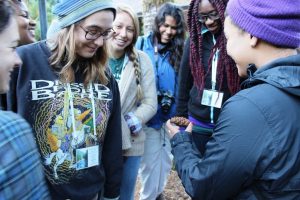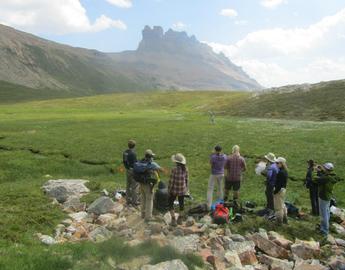Field Trips

Ecology field trips are the cornerstone through which SEEDS introduces diverse students to the range of ecological systems and research in the United States. Students spend three-four days at an ecologically significant site, such as a field station, research laboratory, or national park, learning about the science of ecology, exploring career options, and seeing the practical applications of ecology. Students have the opportunity to find out more about what ecologists do through hands-on experiences with professionals, to receive training in specific areas, and to build networks with students and professionals.

October 2-6, 2024 – Barrier Lake Field Station, Alberta, Canada
 The Barrier Lake Field Station is part of the Biogeoscience Institute of the University of Calgary. Located at the entrance of the Canadian Rockies, the Barrier Lake Station is 80km west of Calgary in the Kananaskis Valley. The station provides a stunning location for research, teaching, conference and workshop facilities operating year-round. In this SEEDS Field Trip students will be learning about glaciers, watersheds, wildlife, grasslands, urban ecology, and so much more – there is a lot of cool ecosystems to explore!
The Barrier Lake Field Station is part of the Biogeoscience Institute of the University of Calgary. Located at the entrance of the Canadian Rockies, the Barrier Lake Station is 80km west of Calgary in the Kananaskis Valley. The station provides a stunning location for research, teaching, conference and workshop facilities operating year-round. In this SEEDS Field Trip students will be learning about glaciers, watersheds, wildlife, grasslands, urban ecology, and so much more – there is a lot of cool ecosystems to explore!
Please note that this trip requires participants to have a valid US Passport at the time of travel. While SEEDS cannot provide passport support or assistance, you can check with your college resources which might often provide assistance.
Application process will close on May 27, 2024 at midnight.

Find out more here: SEEDS National Field Trip
Student Reactions From Previous Field Trips:
“After a long four days of hiking, bonding, learning about ecology, and meeting new people we reminisced over our experiences. This SEEDS field trip has been eye-opening and comforting as college students who have been struggling to find guidance in the research fields. This experience opened-up options to many of us that we didn’t even know were available, such as job opportunities, connections with professors, grad students, and a great support system. As college students, many of us got more out of SEEDS in the past four days than we’ve been getting at our own colleges for years. SEEDS is a wonderful organization that brings students together through our love for science and nature. We will remember this experience and use the skills we learned to better ourselves and become successful scientists.”
To look at more past trips and detailed trip reports, check out our Past Field Trips page.